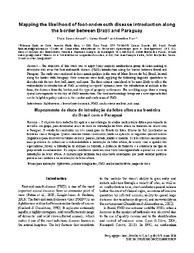Mapping the likelihood of foot-and-mouth disease introduction along the border between Brazil and Paraguay.
Mapping the likelihood of foot-and-mouth disease introduction along the border between Brazil and Paraguay.
Summary: The objective of this work was to apply fuzzy majority multicriteria group decision?making to determine risk areas for foot?and?mouth disease (FMD) introduction along the border between Brazil and Paraguay. The study was conducted in three municipalities in the state of Mato Grosso do Sul, Brazil, located along the border with Paraguay. Four scenarios were built, applying the following linguistic quantifiers to describe risk factors: few, half, many, and most. The three criteria considered to be most likely to affect the vulnerability to introduction of FMD, according to experts? opinions, were: the introduction of animals in the farm, the distance from the border, and the type of property settlements. The resulting maps show a strong spatial heterogeneity in the risk of FMD introduction. The used methodology brings out a new approach that can be helpful to policy makers in the combat and eradication of FMD.
Publication year: 2016
Types of publication: Journal article
Unit: Embrapa Beef Cattle
Observation
Some of Embrapa's publications are published as ePub files. To read them, use or download one of the following free software options to your computer or mobile device. Android: Google Play Books; IOS: iBooks; Windows and Linux: Calibre.
Access other publications
Access the Agricultural Research Database (BDPA) to consult Embrapa's full library collection and records.
Visit Embrapa Bookstore to purchase books and other publications sold by Embrapa.

